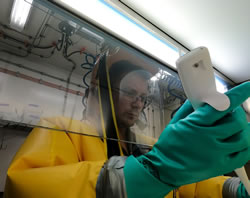 A ‘warm’ COVID-19 vaccine, suitable for remote and resource-limited locations lacking access to cold storage supply chains, is one step closer following an international collaboration between scientists from the Commonwealth Scientific and Industrial Research Organisation (CSIRO) and India.
A ‘warm’ COVID-19 vaccine, suitable for remote and resource-limited locations lacking access to cold storage supply chains, is one step closer following an international collaboration between scientists from the Commonwealth Scientific and Industrial Research Organisation (CSIRO) and India.
In a statement, the CSIRO said its researchers had shown the vaccine formulations triggered a strong immune response in mice; protected hamsters from the virus; and remained stable at 37°C for up to a month and at 100°C for up to 90 minutes.
“Most vaccines require refrigeration to remain effective, like Oxford-AstraZeneca which must be kept between 2-8°C and Pfizer which requires specialised cold storage at -70°C,” the CSIRO said.
“CSIRO scientists at the Australian Centre for Disease Preparedness in Geelong contributed to the study by assessing vaccinated mice sera (blood samples) for efficacy against key coronavirus variants, including the Delta variant currently spreading globally, including in Sydney,” it said.
Director of Health and Biosecurity at CSIRO, Rob Grenfell said the pandemic demonstrated the need for global scientific collaboration to address the urgent demand for multiple cost-effective COVID-19 vaccines and treatments.
“Since the start of the pandemic, CSIRO has played a crucial role in fighting COVID-19 by conducting pre-clinical evaluation of two COVID-19 vaccines including Oxford-AstraZeneca, tracking emerging variants of concern and monitoring wastewater to detect hotspots in the community,” Dr Grenfell said.
He said a thermostable or ‘warm vaccine’ was critical for remote or resource-limited locations with extremely hot climates which lacked reliable cold storage supply chains, including regional communities in Australia’s outback and the Indo-Pacific region.
Further information on CSIRO’s COVID-19 research can be accessed at this PS News link.


